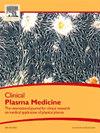Potentiating anti-tumor immunity with physical plasma
Abstract
The age of checkpoint blockage emphasizes the importance of adaptive antitumor immune responses. This arm of immune defense is key in recognizing molecules via specific receptors to distinguish between self and foreign or mutated structures. Antigen-specific T-cells identify non-self epitopes, tumor-associated antigens, or neoepitopes on tumors to carry out attacks on malignant cells. Although tumor cells are immunogenic by nature, they have developed strategies to evade an immune response that would otherwise facilitate their clearance. Several steps in antitumor immunity utilize the toxic and signaling properties of reactive oxygen and nitrogen species (ROS/RNS). Cold physical plasmas are potent generators of such ROS/RNS and are demonstrated to have profound antitumor activity in vitro and in vivo. Here we discuss recent evidence and concepts on how plasmas may boost immunity against pathological cells. Specifically, plasma treatment may enhance the immunogenicity of tumor cells by induction of the immunogenic cancer cell death (ICD) and redox regulation of the antigen-presenting machinery. These aspects provide a rationale for localized plasma-based onco-therapies enhancing systemic antitumor immunity, which eventually may target distant tumor metastasis in cancer patients in a T-cell dependent fashion.

 求助内容:
求助内容: 应助结果提醒方式:
应助结果提醒方式:


